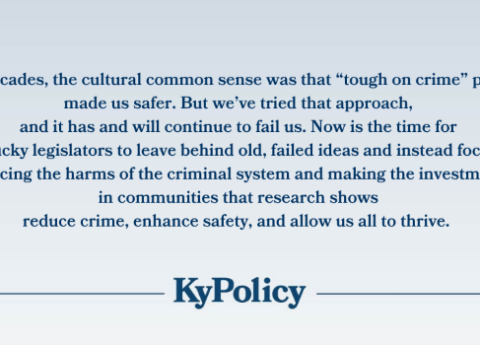Madison County residents are rightly concerned about extreme overcrowding in our jail – currently at 208% of capacity according to recent data from the Department of Corrections. The primary driver for this overcrowding is the county’s high rate of pretrial incarceration. Far too many people presumed innocent but who cannot afford bail end up crammed into our jail while not being able to work, train or care for family members.
Instead of reforming the harmful way we use “money bail,” we’re being told that increasing property taxes to build a huge new jail is the right way forward. This proposed $45 million facility would be more than 4 times the size of the current facility, close in size to the Fayette jail. But its construction would be a wasteful and risky move, making it possible for the county to continue and even scale up harmful pretrial incarceration and putting our county at risk once the state implements criminal justice reforms that must happen.
What’s so harmful about pretrial incarceration? Besides the fiscal costs to our local government, research shows that individuals detained pretrial are more likely to plead guilty even when innocent in order to be released, or be found guilty at trial. Furthermore, people incarcerated while awaiting trial are more likely to engage in criminal activity once released, to lose their jobs and to experience significant strain on their family relationships.
In a public meeting at Eastern Kentucky University on September 3, the Madison County jailer acknowledged that 80% of people incarcerated in the Madison County jail are “unsentenced,” which means, for the most part, they are presumed innocent and awaiting trial. When a resident asked how many of these individuals being housed in the Madison County jail were there because they are too poor to afford money bail, the jailer responded, “I’d say most of them.” In addition, one of the PowerPoint slides presented at the meeting indicated the existence of “an extensive lag time in the judicial timeline from arrest to sentencing” that is contributing to jail overcrowding.
These are issues that can be addressed at the county level without building a new jail. We should be working to convince local justice system actors to make reforms to the pretrial process, and state lawmakers to make needed changes to the justice system.
Other communities in the commonwealth are already doing better than Madison County. Our recent report documenting the disparities in pretrial release across the state shows that just 30% of criminal court cases in Madison County result in release pretrial without financial conditions (i.e., money bail). That’s below the state’s 40% average – which is itself much too low considering these low rates of pretrial release contribute to economic and racial disparities in the justice system – and far below the rate for our neighbor to the south, Rockcastle County, where 51% of cases result in release without financial conditions. Kentuckians presumed innocent should not have their freedom contingent upon their income or where in the state they are arrested.
Building a costly new jail would be a significant and expensive long-term gamble that enables (and even requires) the status quo of locking up so many people. To help pay for costs, the proposal anticipates bringing in more people who are incarcerated by the state – those convicted of a felony in Kentucky who are the responsibility of the Department of Corrections – for which the state pays approximately $31 a day. Providing federal inmate beds is another part of the revenue-raising plan.
Yet while the county will be on the hook to pay for the jail for decades, it will be necessary for the state to make incarceration-reducing policy changes over that time period. When Kentucky moves forward with needed reforms to the criminal justice system including bail reform and policies such as reducing the felony threshold for some offenses like as drug possession, the number of people incarcerated will drop. As mentioned by the Director of the Department of Corrections at the recent public meeting, a number of states — including several in the south — have already moved forward with such reforms that have resulted in significant declines in incarceration. Many facilities have even closed.
In the words of a Madison County resident in Tuesday’s meeting, “We’re assuming failure by planning to build a new jail.” This is a big (and perverse) risk we should not take.
This op-ed was updated on September 10, 2019. It was published in the Richmond Register on September 7, 2019.



